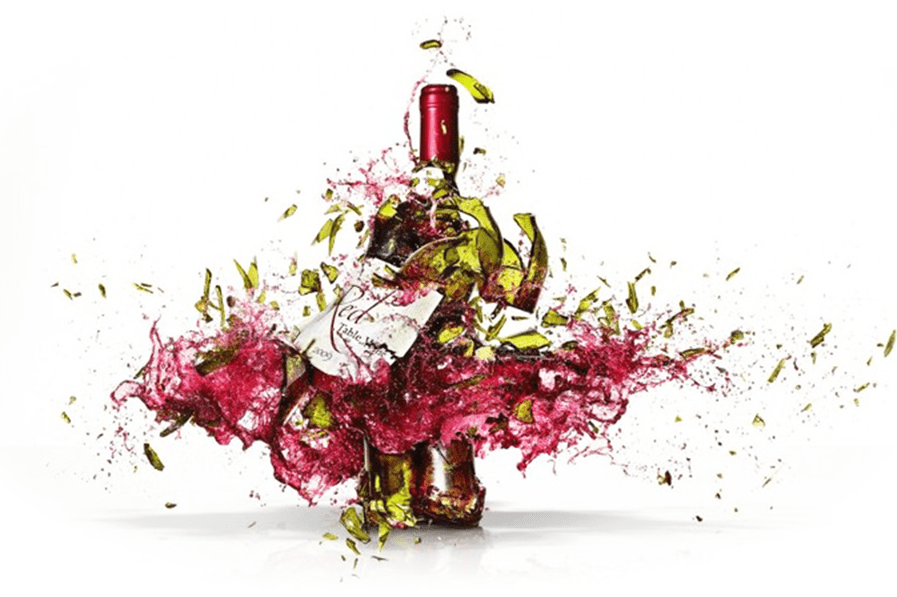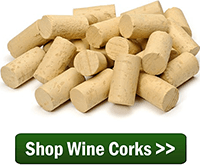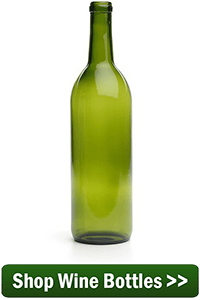 If you didn’t already know what this blog was about, the term bottle shock might conger up some interesting visions. I personally think of someone getting hit over the head by a bottle while in some bar fight, but that’s not quite it. Read on to learn what bottle shock is and why it happens.
If you didn’t already know what this blog was about, the term bottle shock might conger up some interesting visions. I personally think of someone getting hit over the head by a bottle while in some bar fight, but that’s not quite it. Read on to learn what bottle shock is and why it happens.
So What Is Bottle Shock?
Bottle shock is a term used to refer to a wine that is suffering from the symptoms of getting too much air in too little time. These wines tend to be flat in their overall character. Their bouquet lacks fruitiness, and the finish can be just a tad bit off.
Bottle shock normally comes over a wine when it is being bottled. When bottling homemade wines more oxygen than normal becomes saturated into the wine. It can also happen if when the wine is being transported. The sloshing of the wine can cause this effect as will. This is why it is also sometimes referred to as travel shock.
The good news is the effects of bottle shock are temporary. In a matter of weeks after putting in the cork stoppers, or letting the bottle rest after its long journey, the lack-luster wine will blossom back into something that is usually better than what it was before.
Now that you know the answer to, “What is bottle shock?”, it’s time to get to, “Why does bottle shock happen?”
Oxygen is one of the elements that initiates the aging process. It starts a series of chain-reactions which in and of itself is the definition of aging. But, this oxygen must be introduced into the wine sloooowly so that each aging process in the chain can progress in a balanced way. It must also happen if very small amounts. Too much oxygen can be the catalyst for oxidation.
This is because some aging processes can not keep up with the higher infusion of oxygen as fast as others. As a result, the wine begins to taste out of balance until all the different aging reactions can get caught up.
This is one of the major reasons why natural cork stoppers make such great closures for wine bottles. They allows new air into the bottle but at a slow rate. Even synthetic corks are carefully designed and tested to see how much air will slip past them over a given amount of time. This is how critical the rate of oxygen is to the aging process. You need oxygen, just not much of it and not very quickly.
Once the aging catches up to the oxygen, the wine begins to come back to life. The net effect almost always results in a wine that is just as good if not better than it was before bottling.
The Take Away…
 Wines that have been recently bottled are not capable of being at their best because of bottle shock. These wines should be allowed to rest for a few weeks before consumption. A slow infusion of oxygen over a long period of time is what wines need to age. This is why natural corks and synthetic corks make good wine bottle closures.
Wines that have been recently bottled are not capable of being at their best because of bottle shock. These wines should be allowed to rest for a few weeks before consumption. A slow infusion of oxygen over a long period of time is what wines need to age. This is why natural corks and synthetic corks make good wine bottle closures.
Hopefully, this information will help you out a little in your wine making adventures. At minimum, you’ll now know what to say if someone comes up and asks you, “what is bottle shock?”


We added potassium sorbate just before bottling our strawberry wine after we had filtered, polished and sweetening it. it is a crystal clear delicious wine. We love it. BUT…after 2 weeks it is starting to turn bubbly like Champaign. I like the bubbly. But I also know that if we don’t drink it soon it will start popping corks. Is it refermenting and if so why even though we have added potassium sorbate in a ratio of 1/4 tsp./gal. Thank you for your advice.
Claudia, the first thing that I would ask is if you verified with a hydrometer that the fermentation was complete before sweetening and bottling the wine. Potassium Sorbate will not stop a fermentation that did not complete. Now I may be interpreting you wrong, but it sounds like you said that you sweetened the wine and later added the potassium sorbate. If this is the case, to prevent re-fermentation you need to add the sorbate at same time you sweeten the wine. One other thing that you mention that concerns me is the amount of sorbate you added. However, I can only speak for the potassium sorbate that we carry but the dosage to prevent re-fermentation of a sweetened wine is 1/2 teaspoon per gallon.
Ed, we had the same thing happened to our fist batch of strawberry wine. It was finished – by reading of the hydrometer, and we sweetened, let rest for two weeks and filtered twice, because the sugar clogged our gravity filter. After bottling, it rested for 2-1/2 weeks, and ended up popping 2 of 4 corks, and nearly a 3rd one. The 4th bottle, we refrigerated until ready to open. What may have caused this? What did we do wrong?
Christine, you mention that you sweetened the wine but you did not mention adding potassium sorbate to stabilize against re-fermentation. If you did not add potassium sorbate, the reason your corks are popping is because the wine is fermenting in the bottle. If you did add potassium sorbate did you add the appropriate dosage per gallon of wine? One other thing to check is how long have you had your potassium sorbate? It will stay effective for about 2 years.
and you can add a camdon tablet to kill yeast I believe
If wine must be slowly introduced to oxygen to prevent bottle/travel shock, why does a wine aerator produce a better tasting wine almost instantly? I’ve seen people pour wine into a blender and then put the spurs to it — the result was fantastic.
To Ron comments:
In wine fermentation it is recommended to make first racking after 5-7 days to get rid off pulp and sediments. It is recommended to do by siphoning the must and not to splash it to avoid extra oxygen into the must. I do opposite way by splashing wine must from one fermenter to the next one. This way I allow maximum oxygen into the wine to make yeast active crazy and grow its colony to maximum to continue fermentation. And airlock goes on, to prevent any more oxygen until fermentation is completed. As result I have fermentation completed within 2-3 weeks, not 5-7 weeks like it was before. The wine comes dry with SG 0.990-0.995, absolute clear (no need bentonite) and rich in flavor, no need sweetening. Now, the MAIN point: I live in tropical zone of Caribbean, with temperature up to 100F at day time and 85F at night. According to other winemakers opinion there is not possible to the wine yeast to perform in such hit. I have broke that opinion and prove with my dry wine high quality, never stuck fermentation! The oxygen is your friend to boost fermentation and to complete it with XLT result. The oxygen is not your friend after the wine bottled. This is why the classic cork is not good. I am using screw top bottles and never have that problem as described in article. Even my storage room has 90F temperature during a day time. Just keep bottles in cartoon boxes, it works to stabilize the hit. It might sounds unbelievable for you, but it is in my practice and I have great wine made with tropical fruits: cashew, mango, banana, pineapple, plum, papaya….
I have been reading about “bottle shock” in previous posting and it got me thinking. I’m pretty cheap. I have a bunch of good quality beer bottles. I put 5 gallons of blackberry wine in those bottles. I then capped them and dipped them in wax to prevent oxygen from getting into the wine. As I read about having small, minute amounts of oxygen being admitted to the wine over time I’m thinking I screwed up. Feedback!!!!!
Dave, The ability of the wine to improve with aging may be impaired by using beer bottles, not because of the bottle, but because of the bottle caps. Cork stoppers allow a wine bottle to breath slowly or exchange air over time. This is was causes aging to occur… a very slow infusion of air. Bottle caps do not allow for this exchange. Bottle caps don’t let any air through at all. Couple this with adding sealing wax and it will be difficult for the wine to age. For more information, please see the article posted below.
Can I Bottle My Wine In Beer Bottles
https://blog.eckraus.com/can-i-bottle-my-wine-in-beer-bottles
I like to make my finished bottles look professional by shrink wrapping the corks does this prevent the proper slow aging of letting oxygen through the corks